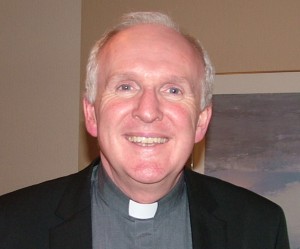
By Sarah Mac Donald - 03 February, 2016

Bishop Brendan Leahy
“Things are changing and change must not be viewed as a bad thing,” the Bishop of Limerick said on his return from Paris where he and members of the clergy in Limerick spoke to parish representatives in the French capital which are addressing their vocations decline.
In a statement on Tuesday, Bishop Brendan Leahy said that the fall in vocations over recent years in the Church must be taken as an invitation to deepen renewal.
He said Limerick diocese and Church of tomorrow will be strengthened by the journey it is now embarking on.
“We are at a time of exploration, at looking how we reinvent and reimagine the Church not only to deal with the fall in vocations but to correspond to what God proposed to us as far back as the Second Vatican Council, which presented a vision of the Church as the People of God,” Dr Leahy stated.
“Things are changing and change must not be viewed as a bad thing. We aren’t just reacting to the decline of clergy; we are responding to what is a new invitation from God to go and create a new relationships with all those around us.”
Dioceses in the Irish Church are looking at the implications of the decline in priest numbers and recently a report commissioned by the Dublin Diocesan Priests Council predicted a drop of between 61 and 70 percent in the number of priests in active ministry by 2030.
The best case scenario predicted by the Towers Watson Report predicts a decline in priest numbers of 61 percent, from 369 priests down to 144, provided religious orders maintain their current level of commitment in parishes in the archdiocese of Dublin.
Elsewhere in his statement, Bishop Leahy said the diocese of Limerick has been adapting for a decade or so by developing clusters and pastoral areas.
But he said the diocese is now “very much now in a period of exploration, not least as we approach our Limerick Diocese Synod in April”.
He said they decided to go to Paris to look at how parishes there have dealt with changing arrangements in the past decades.
“They have not just been good at putting arrangements in place to deal with the fall-off in vocations but they have also made sure those changes dovetail with theology and spirituality. There is a great sense of zeal and energy there today.”
Dr Leahy said the Irish contingent had meetings with current and retired bishops, with pastoral teams, people living in the area and it really was an invigorating experience.
“We are emboldened by it as it has really given us a sense of the opportunity that this process can enrich the Church’s role and relationship in communities. But we also learned that we have a lot of positive things happening at home; there’s awful lot right about what we are doing.”
“The Church is still alive but we must ensure it stays alive. But it’s important to remember it is lay people that will bring the Church forward, not only the priests.”
Underlining that the involvement of the laity as Eucharistic ministers and readers, choirs, people involved in liturgy and social actions is not new, the Bishop said he was now looking at deepening the role of the people in the pastoral administration of the parishes and the diocese.
“It has started with pastoral councils but we need now to take new steps,” he explained.
“This whole process, this exploration in Paris and generally through the Synod is also allowing us all to learn more from one another, priests to learn more from the laity and vice versa, and also for priests to learn more about ourselves. It’s a renewal in many ways. But it is probably more of a coming together of all of us as the People of God than we’ve ever had before and we are really determined to make it work.”